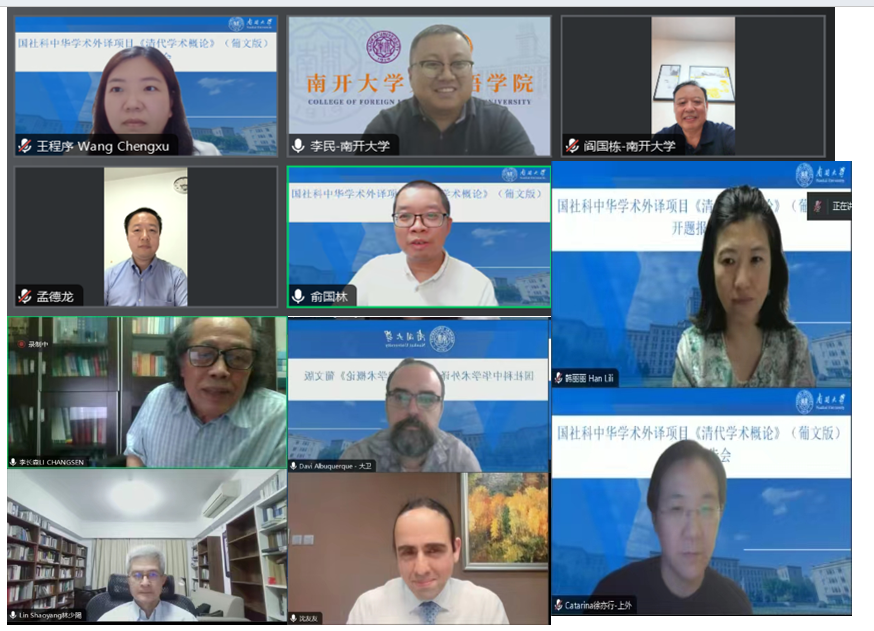On September 4, 2024, the proposal meeting for An Overview of Qing Dynasty (Portuguese version), as one of Chinese academic translation projects of the National Social Science Fund of China (NSSFC), was successfully held online. This project was jointly submitted by Wang Chengxu, a Portuguese department instructor from the School of Foreign Studies (SFS) at Nankai University, and the Zhonghua Book Company, with Wang serving as the project lead.

The proposal meeting was chaired by Professor Li Min, Vice-president of the SFS at Nankai University. Attendees included Yu Guolin, Deputy Chief Editor of the Zhonghua Book Company; Meng Delong, Assistant Minister of the Department for Humanities and Social Sciences Research Administration at Nankai University; and Professor Yan Guodong, Dean of the SFS, who all delivered opening remarks.
The project defense was convened by Professor Li Changsen from the Macau Polytechnic University. Experts participating included Professor Xu Yixing from the Portuguese Department at Shanghai International Studies University, Professor Lin Shaoyang from the History Department at the University of Macau, and Associate Professor Davi Albuquerque from Nankai University’s SFS.
The project team includes the lead translator Wang Chengxu and members such as Associate Professor Giorgio Sinedino (Chinese name: 沈友友) from the University of Macau (chief translator), Professor Jin Guoping from the Research Center for the History and Culture of Hong Kong and Macao of Jinan University (Chinese advisor), Associate Professor Han Lili from the Faculty of Applied Sciences at Macau Polytechnic University (proofreader), Associate Professor Li Chengqing from the Department of Chinese Language and Literature at Peking University(subject expert), and Professor André Bueno from the History Department at Rio de Janeiro State University (foreign advisor).

Professor Li Min began by introducing and welcoming the participating experts. In his speech, Assistant Minister Mengcongratulated the SFS on its recent successes in securing the NSSFC translation projects. He highlighted the significance of this project for Nankai University, referencing Liang Qichao, who lectured at the university a century ago and influenced a generation of Chinese youth, including renowned alumnus Zhou Enlai.
Prof Yan noted that the participating professors are among the most prominent experts in the fields of Chinese-Portuguese translation, modern intellectual history, and classical literature research. He emphasized the importance of producing a translation that reflects the highest standards of Chinese scholarship and cultural essence under the experts’ guidance.
Yu, one of proofreaders on An Overview of Qing Dynasty and Deputy Chief Editor of the Zhonghua Book Company, remarked that the project carries special commemorative value. Liang Qichao, a leading Chinese Enlightenment thinker, served on the board of the Zhonghua Book Company from 1914 and used Nankai University as a platform to disseminate his academic ideas. Therefore, the edition, developed in collaboration with Nankai University and Brazilian Sinologists, holds historical significance for all three parties—Liang Qichao, the Zhonghua Book Company, and Nankai University.

Following the opening ceremony, the defense session, chaired by Professor Li Changsen, began. The project leader Wang presented the project background, the organizational plan for translation and editing, and the strategies for promotion and dissemination. The expert panel affirmed the presentation and provided feedback, raising questions and offering recommendations.
Professor Li Changsen expressed high regard for the team’s structure, task distribution, translation standards, and technical approach. He acknowledged the significant challenges posed by the choice of linguistic style and translation strategies, particularly in rendering specialized terminology from classical texts. The team plans to address these challenges by adopting a functionalist translation approach, using strategies such as domestication, foreignization, and annotation to ensure accessibility for general readers and reliability for academic researchers in Brazil. Professors Lin, Xu, and Associate Professor Davi Albuquerque posed questions regarding the differences between the original text and other editions, the use of reference materials, and the preparation of translator’s introductory essays. The project team addressed each query and incorporated the experts’ suggestions.
After nearly two hours of discussion and exchange, the expert panel unanimously concluded that the project is of great significance, the team possesses extensive translation experience, and the proposed plans for translation and promotion are highly feasible. The panel approved the project to proceed.



